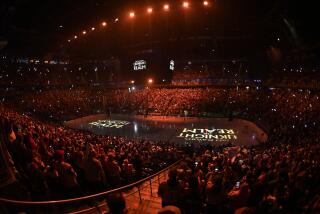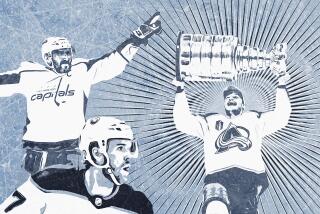That Old Red Magic : Canucks Look for Scoring Spark With Reunion of Former Soviet Army Teammates Bure and Mogilny
- Share via
VANCOUVER, Canada — When the Vancouver Canucks acquired Alexander Mogilny from the Buffalo Sabres in July, taking on his $3.7-million salary and his complex personality, they deemed it a fair price for the fireworks he would ignite playing on the same team--or even the same line--with Pavel Bure once again.
They were sensational in leading the Soviet Union to the gold medal at the 1989 world junior championships, establishing themselves and center Sergei Fedorov as the next cogs in the great Soviet hockey machine. That never happened because Mogilny, lured by high salaries and high-caliber competition, defected in 1989 and signed with Buffalo. Two years later, Bure put up $50,000 to get released from his Red Army team contract and joined the Canucks.
The Sabres’ decision to trim their payroll this season gave Vancouver the chance to reunite the dynamic duo, but the anticipated explosion has, until recently, sounded more like a pop-gun. By tradition a grinding, win-it-in-the-trenches team, the Canucks are struggling to adapt to a higher skill level. Expected to dominate the Western Conference, Vancouver is in the middle of the Pacific Division at 5-5-5.
“It’s nice to be together,” Mogilny said. “But you can’t just close your eyes and have things happen.”
That’s not to say the deal is a failure. The club’s preseason campaign, which featured Bure and Mogilny and the theme “Together Again,” sold 12,000 season tickets, up from 8,500 last season. Canuck officials attribute that to Mogilny, the novelty of the new General Motors Place and to stable ticket prices.
And maybe it was unrealistic to think they would immediately cause sparks and turn the plodding Canucks into gazelles. Mogilny, who scored 76 goals in 1992-93, looked lost in exhibition games after Coach Rick Ley moved him from right wing to the left side to accommodate Bure, and put Mike Ridley between them.
Bure, twice a 60-goal scorer for Vancouver, fared better, but they were looking for each other too much and not playing their games.
“They were kind of running into one another,” Ley said.
Bure wasn’t surprised.
“The last time we played together was seven or eight years ago, when we were kids,” said Bure, 24, two years younger than Mogilny. “And we played on bigger rinks and we played a different kind of hockey. Now we play in the NHL, on smaller rinks. There are lots of differences.”
Another difference: Their center used to be Fedorov, who was the NHL’s most valuable player in 1993-94 with the Detroit Red Wings.
“The center man is the most important person on the hockey club,” Mogilny said. “He is the switch.”
After the initial experiment in togetherness, Mogilny began the season at right wing with Roman Oksiuta and center Cliff Ronning, and Bure skated with Russ Courtnall and various left wings.
But a desperate Ley put Mogilny and Bure together again last week with Josef Beranek at center. That combination clicked, but Bure sprained his right knee Thursday and is day to day. Mogilny has 13 goals and Bure has six.
“Our centers are pretty much different types of centers,” Ley said. “Cliff is our playmaking center and our other centers are more put-it-in-the-zone-and-forecheck. I imagine if a good playmaking center became available, we’d have to look at that.”
Finding the right center would be worth the effort. Players like Bure, whose speed leaves defenders standing like traffic cones, and Mogilny, who has astonishing acceleration and a ferocious wrist shot, are rare.
“They’re probably two of the most exciting players in the league,” forward Trevor Linden said. “We’re fortunate to have a couple of guys like that. [Mogilny] is so deadly. He’s just another game-breaker. Not many teams can say they have two game-breakers of our caliber.”
Although the wingers are similar on the ice, they differ in temperament.
Bure, who signed a five-year, $25-million contract in 1994, lives in a house hidden by a gate and a high hedge, a good metaphor for the polite but guarded manner he has with everyone but his closest friends. His reserve may be a protective mechanism, because he is a celebrity in Vancouver and is mobbed everywhere he goes. In his fifth season with the Canucks, he accepts but doesn’t quite comprehend teen-age girls’ squeals or adults’ tongue-tied awe at the mere sight of him.
“It’s coming with the job,” he said, shrugging. “It feels like everybody knows me here, no matter how old, 70 years old or 10 or 5. Most of them are nice people and very polite. They just come up to you and say, ‘Good luck,’ or if things are going right, they say, ‘You are playing well.’ ”
Bure stays within a circle that includes his father, Vladimir, an Olympic swimming medalist who works as the Canucks’ fitness consultant, Mogilny and teammate Gino Odjick.
By contrast, Mogilny is more sociable, more comfortable with English and more apt to explore the world around him.
“This city is so beautiful,” Mogilny marveled. “Back in Buffalo, you would have a day off and you would wonder, ‘What the hell am I going to do now?’ It’s not like you can hop in the car and go see the mountains. There are some beautiful things about this town.”
It was odd that he followed Bure to Vancouver because Bure always followed him, first to the Red Army team, then to the national team and the NHL.
Mogilny grew up in remote Khabarovsk, near the Chinese border. The town had no indoor rink, so if he wanted to play hockey, he had to shovel the ice clean of snow. His talent was obvious at an early age, and scouts for the Red Army, which supplied many players to the Soviet national and Olympic teams, spotted him at a junior tournament and invited him to Moscow for a tryout. He was only 15, but he was ready for his shot at the big time.
“All the roads are going through Moscow,” he said. “If you want to make the national team, the big team, you’ve got to go through Moscow. So one day I said to my parents, ‘Can I try it?’ I packed my bag and left by myself. It was an eight-hour plane ride.
“If you want to survive in this world, you’ve got to do things like that. Otherwise they’re not going to come to you. You’ve got to go and find them.”
As a boy, he knew or cared little about the NHL. But once he reached the elite level--he was the youngest Soviet hockey player to win an Olympic gold medal, turning 19 during the 1988 Calgary Games--he met NHL stars and began to hope he might someday play against them. To do that, though, he had to defect from his homeland and desert the Soviet Army, in which he was a junior lieutenant. He took that daring step at the 1989 World Championships in Stockholm, then later joined the Sabres.
“I was nervous,” he said. “I didn’t know what to expect. When I first got to camp, I had to fight for my place on the team. I actually fought a couple of times in training camp. I had to prove my ground. It wasn’t my idea, but you’ve got to defend yourself. . . .
“I was young, it was a new country, a new language, new everything. It was very tough. All of a sudden so many problems come down on your shoulders. It was like, ‘Wow! Now you’ve got to worry about your mortgage payments and bills and all those things.’ I’m thinking, ‘Wow! I’ve got to play hockey also,’ because we didn’t have to do all those things over there. You say, ‘How can I do all this?’ ”
He did it all--superbly.
“He was great to play with,” said Pat LaFontaine, Mogilny’s center during his 39-goal effort in 1991-92 and his 76-goal season. “He’s a world-class player. With his hockey sense, he was at a different level from everyone else. When we played together we developed a nice sixth sense. I remember making passes where I’d think he would be and there he was. Those were two years I’ll always remember.”
The Sabres, however, would like to forget some of his deeds. They cringed when he played golf instead of going for treatment on an injured ankle, and they despaired at his reluctance to be a leader when he replaced the injured LaFontaine as captain.
They reached the breaking point last spring, when he skipped the end-of-season meeting with then-Coach John Muckler. They were so eager to trade him, they agreed to pay $500,000 this season and next toward a bonus clause in his contract.
Mogilny called Muckler to apologize, but he wasn’t contrite about missing the meeting.
“Everything was over, and I knew I was going to be out of there and there was really no point in getting there,” he said. “I knew what he had to say, that we lost in the first round [of the playoffs] again. I knew 20 guys would be in line to meet and everybody takes two or three minutes, so that was two or three hours’ wait. There was no point in it. . . .
“It was good for me to get traded. I’m glad about it. I’m enjoying my new career here.”
Said George McPhee, Vancouver’s director of hockey operations, “When you see him, you see one of the highest-skilled guys in the world, a guy who scored 76 goals in this league. We felt that with a change of scenery he could do that again. We’re getting an extraordinary player, and we’re seeing signs of his maturing.”
There are signs too that Mogilny and Bure rediscovered their old magic before Bure got hurt, and when he returns they may ignite the fireworks the Canucks had hoped for.
“We’re right in there,” Mogilny said. “But with our talent and our skills, we should be way higher. You’ve just got to believe.
“It’s a mental game, and I’m sure this team knows what it takes because they’ve been there [to the 1994 Cup finals]. They barely made the playoffs that year and then came within one game of winning the Stanley Cup. Basically it’s the playoffs that matter. You want to get there and you want to show your hometown fans some good hockey.”
More to Read
Go beyond the scoreboard
Get the latest on L.A.'s teams in the daily Sports Report newsletter.
You may occasionally receive promotional content from the Los Angeles Times.







